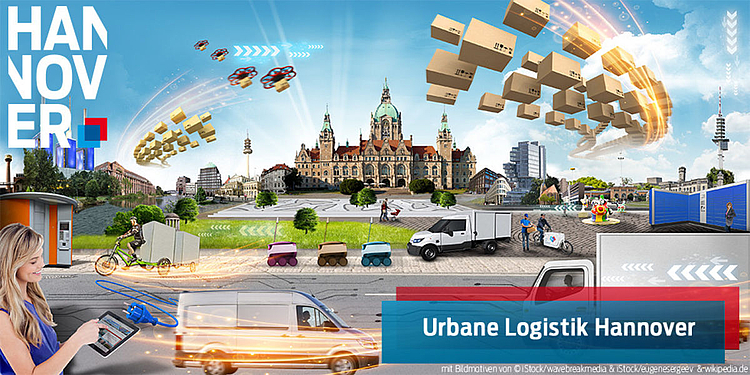USEfUL

| Team: | Wage, Feuerhake |
| Year: | 2018 |
| Funding: | BMBF: 03SF0547 |
| Is Finished: | yes |
Analyzation, Simulation and Evaluation Tool for Urban Logistics
Problem: common challenges in dense and urban areas are air purity, noise and generally a city worth living in.
Due to its location at the center of Europe and the global operating companies, logistics and mobility have always been of outstanding importance in Hanover, a city rebuilt car-friendly after the war. A growing city is associated with increasing mobility and supply needs as well as an individually and systemically caused need of logistics for supply and disposal. At the same time, cities around the world - and Hanover is just one example of this - face the challenges of air pollution, noise reduction and the climatic consequences of increasing mobility needs with the aim of maintaining living conditions worth living for their inhabitants. Urban logistics is becoming increasingly important - on the one hand due to the current trend of growing cities and on the other hand due to changes in user behavior and new business models - driven also by the influences of the digitalization.
Goal: scenario simulation in decision support tool
o The system-independent acquisition, simulation and evaluation of future- and target-oriented solutions for urban logistics is the focus of the USEfUL project. A cross-system understanding is necessary for a situation analysis that follows the transport policy paradigm of traffic avoidance, modal shift and sustainable, low-emission traffic management. For the first time, this should cover the sociodemographic and economic backgrounds that initiate urban logistics, the behavior of residents and businesses, and their supply and disposal needs for goods and services. The data are to be linked with traffic and emission data in the sense of reliable cause-and-effect chains and made available for data analysis. Conversely, the influence of regulatory, technical or organizational actions on the acceptance and behavior of the individuals up to the district level is to be assessed in order to identify the most effective bundle of concepts. At the same time, transferability and scalability to other municipalities and their specific district and traffic situations will be ensured. The knowledge gained will form the basis for a web application that will support the municipality in its decision-making.
IKG: big data analytics and visualization
The complex spatio-temporal and thematic relationships in the field of urban logistics can be analyzed using spatial data mining or machine learning methods. In addition, the data and its dependencies can be visualized and explored by means of interactive web maps, even for those who are not familiar with the subject. In order to scale to very large data sets and to process heterogeneous data, big data approaches have recently been used.
Cooperation: transdisciplinary
In addition to the IKG, with its contribution to (geo) data analysis and visualization, other project partners contribute their expertise. The Department of Planning and Urban Development of the City of Hanover takes over the project management and contributes its long-standing experience in the field of climate-oriented urban traffic development. Due to its product portfolio with city delivery vans, urban logistics is an important field of action for Volkswagen Commercial Vehicles. As a further institute of the University of Hanover, the Institute for Information System Research contributes its experience in the areas of Big Data Analytics, simulation and decision support systems as well as application development. The University of Applied Sciences Hanover, with its faculties of Automotive Engineering, Computer Science and Business Informatics of the Faculties II and IV, is involved in the analysis and modelling of driving cycles, the development of innovative logistics concepts, supply chain simulations and agile IT methods. The Automotive Research Centre Niedersachsen of the Technische Universität Braunschweig integrates traffic simulations, with the help of which a logistics-related mobility demand and scenario analyses are carried out.
Deutsche Post DHL Group, the State of Lower Saxony and Enercity are also involved in the overarching Urban Logistics Hannover project initiative.
